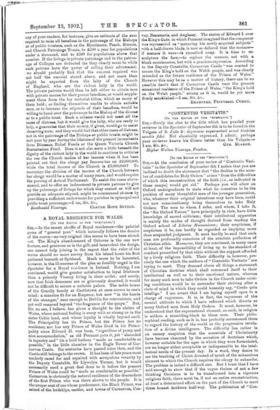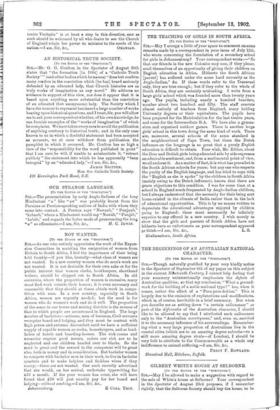[To TIE EDITOR OP TILE " SPECTATOR.")
Sin,—At the conclusion of your review of " Contentio Veri- tatis " in the Spectator of September 6th I notice that you are inclined to doubt the statement that "the decline in the num- ber of candidates for Holy Orders" arises "from the difficulties of which this reconstruction of the faith [i.e., as indicated in these essays] would get rid." Perhaps you will allow an Oxford undergraduate to state what he conceives to be the position of many thoughtful men of the younger generation, who, whatever their original intentions may have been, could not now conscientiously bring themselves to take Holy Orders. The men to whom I refer, and whom, I take it, the "Six Oxford Tutors" have principally in view, have little knowledge of sacred criticism; their intellectual apparatus is mainly the modes of thought derived from reading the Oxford school of Liierae Humaniores ; their scepticism, if scepticism it be, can hardly be regarded as implying more than suspended judgment. It need hardly be said that such men are profoundly conscious of the absolute perfection of Christian ethic. Moreover, they are convinced, in many cases at least, of the impossibility of living up to the standard of conduct prescribed by that ethic without the support afforded by a lively religious faith. Their difficulty is, however, pre- cisely the one which the authors of " Contentio Veritatis " are trying to meet. They demand above all things a statement of Christian doctrine which shall commend itself to their intellectual as well as to their emotional nature, whereas for many such men to take Orders in the Church under exist- ing conditions would be to surrender their striving after a state of mind in which they could honestly say, "Credo quia intelligo." I am aware that I am laying myself open to a charge of vagueness. It is, in fact, the vagueness of the mental attitude to which I have referred which diverts so many Oxford men from Holy Orders. It must, however, be understood that the supernatural element, as such, in religion is seldom a stumbling-block to these men. Their philo- sophical reading, such as it is, has probably accustomed them to regard the history of the world as the progressive revela- tion of a divine intelligence. The difficulty lies rather in an uneasy suspicion that the essentials of Christianity have become obscured by the accretion of doctrines which, however suitable for the ages in which they were formulated, are no longer either acceptable or indispensable to the intel- lectual needs of the present day. In a word, they desire to see the teaching of Christ divested of much of the miraculous element to which the Church requires the clergy to subscribe. The problem is indeed a difficult one. But I trust that I have said enough to show that if the vague theism of not a few thinking Oxonians is to be transformed into a vigorous religious faith, there must be, if not an entire reconstruction, at least a determined effort on the part of the Church to meet these honest doubters half-way. The publication of "Con-
tentio Veritatis" is at least a step in this direction, ana as such should be welcomed by all who desire to see the Church of England retain her power to minister to the needs of the







































 Previous page
Previous page